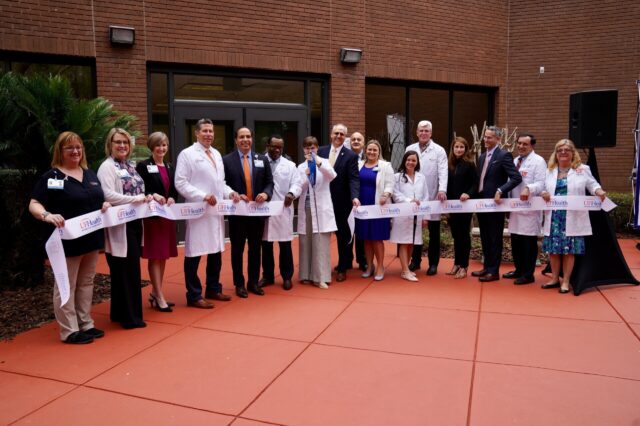UF Health opens new center to help those with autism and neurodevelopmental disabilities

For more information, please contact Ken Garcia at kdgarcia@ufl.edu or 352-273-9799.
University of Florida Health today cut the ribbon on its new Center for Autism and Neurodevelopment, a multidisciplinary, collaborative facility that will provide specialized care and resources to children and adults with neurodevelopmental disorders and their families.
“In and around the Gainesville community, parents have had barriers to obtaining diagnoses, assessments and appropriate treatments for their children,” said Carol Mathews, M.D., interim director of the new center. “This new center will break down those barriers. We will help increase access to appropriate diagnostic services and care.”
Known as UF Health CAN, the 15,000-square-foot center near UF Health’s Springhill medical complex will feature two full-time patient navigators who will help families coordinate multiple aspects of care both on- and off-site with expert clinicians, including physicians, occupational therapists, speech-language pathologists, physical therapists and psychologists. The facility boasts a gym with a rock-climbing wall and state-of-the-art equipment for occupational, speech and physical therapy; rooms for clinical/behavioral intervention research; clinical space for telemedicine; and new offices for outreach, advocacy and support services.
Located at 4101 NW 89th Blvd. in Gainesville, CAN officially opens to patients on Friday.
UF’s Center for Autism and Related Disabilities, or CARD, which had been on UF’s East Campus, will share space with the new center and continue to offer training, assistance and consultation to clients from 14 Florida counties.
“The collaboration and co-location of UF CARD, UF Health CAN and UF Health Rehab provides a much better experience for our clients because many of the services they need are now under one roof,” said Ann-Marie Orlando, Ph.D., CCC-SLP, associate director of CARD and a research assistant professor in the UF College of Medicine’s department of psychiatry. “This will save them time and travel, which is especially important for those who live in surrounding counties.”
Generous support from UF Health Shands, donors and UF’s “moonshot” initiative — a bold endeavor announced in fall 2018 to take on some of society’s most urgent challenges — have provided the resources to renovate the former location of the UF Health Shands Rehab Hospital to create the new center.
CAN will offer timely assessments and reduce waiting time, as formal diagnosis is the key first step toward obtaining medical treatment and services such as social-skills training, feeding strategies and behavioral therapies.
“This new center will expand services, provide access to community resources, promote research and create a single point-of-entry for patients and families navigating the multidisciplinary and specialized care we offer patients with autism and other neurodevelopmental disorders at UF Health,” said David R. Nelson, M.D., senior vice president for health affairs at UF and president of UF Health. “Under the visionary leadership of Dr. Mathews and her colleagues, we expect this center to grow and evolve over time to provide even more support for these patients and families.”
Ed Jimenez, CEO of UF Health Shands, said CAN is a great example of UF Health’s commitment to providing facilities that match the talent of its faculty and staff. “This new space will not only benefit our patients, but it will also facilitate communication and teamwork among our faculty and staff,” Jimenez said.
Anyone with autism or a neurodevelopmental disorder of any age is eligible for services at CAN. In addition to patients with autism, CAN will serve those with Prader-Willi syndrome, neurofibromatosis, Rett syndrome and Down syndrome, among other disorders.
“Autism and neurodevelopmental disorders are complex conditions that require a broad array of specialists and sophisticated diagnostic and intervention services,” said Mathews, a professor of psychiatry and the director of UF’s Center for OCD, Anxiety & Related Disorders. “That can be very difficult to navigate for a patient or a provider, particularly for a parent with a child who has acute needs. What this service will provide is the ability to help the families navigate those services efficiently and find what the patient needs within the community and within UF Health.”
The UF Health Rehab Center for Kids at Magnolia Parke will continue its services as before, but some patients in need of higher-intensity treatment for autism and neurodevelopmental concerns will now be seen in a new clinical rehab space at CAN. Occupational, speech and physical therapy services will be offered in this new location through the UF Health Rehab Center. Beginning this summer, CAN will work collaboratively with community treatment providers to offer behavioral interventions for severe feeding issues, problem behaviors and social-skills training. CAN also has research rooms for clinical/behavioral intervention research such as interventions aimed at helping kids tolerate medical or dental procedures.
“This is an exciting new endeavor bringing so many interdisciplinary team members into one location to serve the members of our community with autism and neurodevelopmental conditions,” said Patty Helsel, OTR/L, division manager of UF Health Rehab Center.
Additionally, CAN will have an informal “swing” space for community affiliates, where educational and vocational advocates can meet with families on a rotating basis.
CAN is accepting appointments via its website at https://autism.psychiatry.ufl.edu or by phone at 352-733-1030.
About the author
